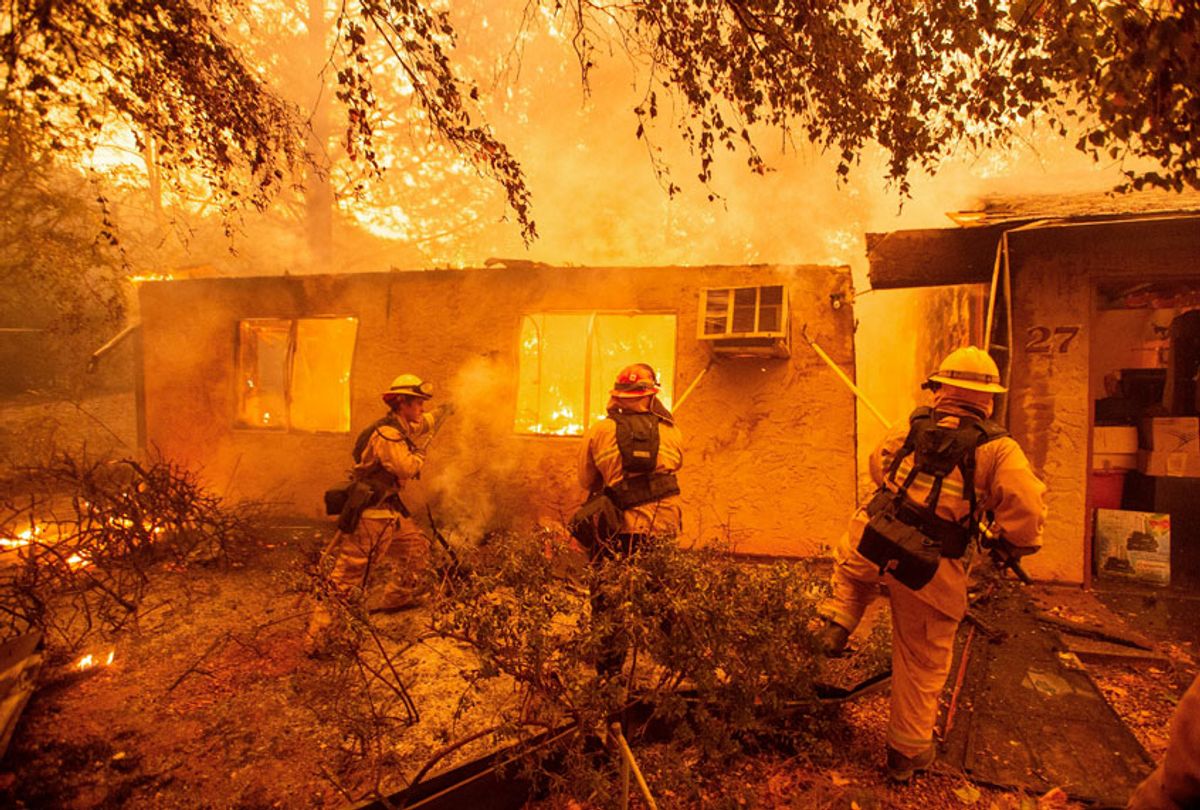New details have emerged about the events leading up to the devastating fire in Northern California, known as the “Camp Fire,” which has killed at least 42 people. While the cause remains under investigation, a report by AP News suggests that for-profit regulated monopoly Pacific Gas and Electric Company (PG&E) could be to blame. PG&E has a history of negligence leading to deaths, including a massive gas explosion in a San Bruno, Calif. neighborhood in 2010 that killed 8. And in an ironic, enraging twist, the utility company may be able to defray the cost of its negligence by up-charging consumers — meaning the public may pay for their negligence.
The AP report states that Betsy Ann Cowley, a landowner in the small town of Pulga, Calif. — near where the fire reportedly started — received an email from PG&E last Wednesday saying they needed to come by her property, which is used for corporate rentals, to work on the high power lines. PG&E said, via the report, “they were having problems with sparks.” Cowley was on vacation and was not on the property during the time of the visit.
Cowley lost her home in the fire. Fire investigators have declared the area surrounding power lines on her property a crime scene, the report states. Cowley told Bay Area News Group she’s tried to get in touch with the company since, but hasn’t been successful.
"I’ve continuously tried to get in touch with them [transmission line workers] but nobody is in charge and they suck at communication," she told Bay Area News Group.
PG&E told the AP it has provided state regulators with an “initial electric incident report,” but declined to discuss the email.
Cowley isn’t the only frustrated victim of the fire in Paradise, California.
“Seems like the responsibility is pointing toward them,” Travis Crockett, who lost his home, told Bay Area News Group. “Even on our street, there’s a bunch of power lines going through trees.”
Nearly 48 hours before the fire started, PG&E had reportedly warned counties — including Butte, which has since been destroyed from the fire — that there would possibly be a power shutdown, according to the report. This happened last Thursday, when the company said the potential shutdown would be due to dangerous fire weather conditions. The utility company ultimately decided to keep the power on. Moreover, according to Bay Area News Group report, PG&E disclosed that it detected an outage on a transmission line in Butte County, 15 minutes before the fire was reported, in a filing to the California Public Utilities Commission.
PG&E is already facing billions of dollars in potential liability lawsuits in regards to other destructive wildfires — specifically, the ones that burned down Wine Country in Northern California last year. In California under a legal doctrine known as inverse condemnation, utilities can be held liable for financial losses from fires that were caused by their equipment. This applies even if the utilities company followed the state’s safety regulations. The utility behemoth advocated to overturn the doctrine. In September 2018, California Governor Jerry Brown signed a legislation that now allows utility companies to pass their liability costs to customers.
PG&E has a rocky history when it comes to wildfires in California. The aforementioned 2010 gas explosion, the result of an exploding PG&E pipeline, returned to the news last year when a San Francisco judge charged the utility company with six felony charges — which included a $3 million fine.
Following the 2017 sentence, PG&E vowed to keeping its customers and the state safe.
"We at PG&E have committed ourselves to a goal of transforming this company into the safest and most reliable energy provider in America. Of course, words are not enough, and we expect to be judged by our actions,” the company said in a statement.
The details that have emerged of the events leading up to last week’s fires don’t exactly align with such efforts though, causing some state legislators to think of ways to hold the company responsible if found liable.
State Senator Jerry Hill told ABC News he is looking into a legislation to break up the utility company.
"They have positioned it that they are too big to fail, I frankly think they're too big to succeed, that's why we need to take a closer look at PG&E," Hill said. "You could take away their license to do business in California as a monopoly. You could then open it up for a competition."
Mindy Spatt a spokesperson for TURN, The Utility Reform Network, told ABC it’s possible PG&E will try to raise customer rates if held liable.
"I think we can expect that PG&E will once again be saying we can't afford this. Well, customers can't afford it either," Spatt told ABC.



Shares